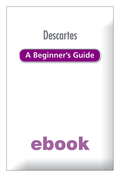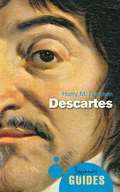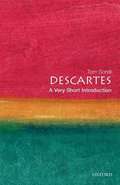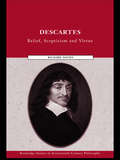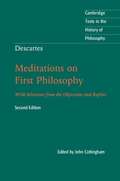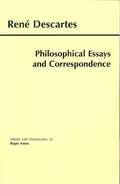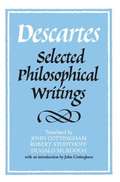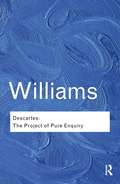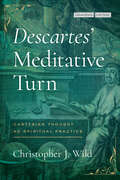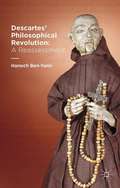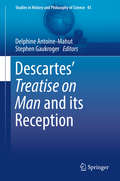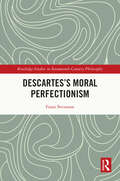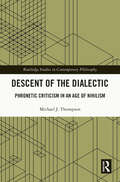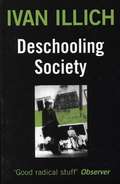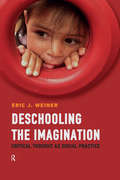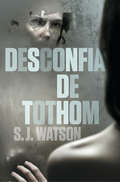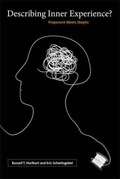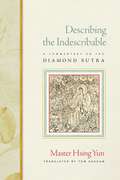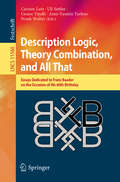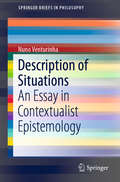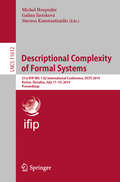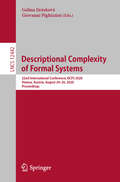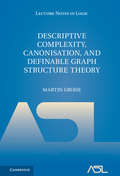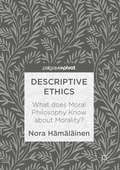- Table View
- List View
Descartes: A Beginner's Guide
by Kevin O'DonnellThis useful guide introduces the reader to the so-called 'father of modern philosophy' - Rene Descartes.
Descartes: A Beginner's Guide (Beginner's Guides #14)
by Harry M. BrackenThe father of modern philosophy, Descartes is still one of the most widely discussed philosophers today. Putting rationalism above all else, he sought to base all knowledge of the world on a single idea: "I think, therefore I am". This introduction expertly summarises his thoughts on the dualism of mind and body, his "proofs" for God's existence, and his response to scepticism. Explaining how his life informed his philosophy, Bracken explains the philosopher's enduring significance.
Descartes: A Very Short Introduction
by Tom SorellMuch previous literature on Descartes treats his dualistic metaphysics as if it were disconnected in a manner analogous to his problematic mind-body split from his natural philosophy. As part of a series complementing the International Research Library of Philosophy, this volume reflects the trend in recent Descartes studies to affirm the increasing convergence of the history of science and the history of philosophy. While most of the 27 selections collected from 1983-96 readily resonate with standard English language Cartesian commentaries, several translated essays from French and Italian contributors befit Descartes' pivotal role in Western intellectual history. The nine-branched organizing schema includes essays pondering: method; metaphysics and Cartesian metaphysics; meditation and doubt; 'cogito ergo sum'; ideas, truth, and judgment; God; mind and body; matter and motion; and ethics and anthropology. Lacks a subject index. Annotation c. Book News, Inc., Portland, OR (booknews.com)
Descartes: Belief, Scepticism and Virtue (Routledge Studies in Seventeenth-Century Philosophy)
by Richard DaviesDescartes is often regarded as the founder of modern philosophy, and is credited with placing at centre stage the question of what we know and how we know it. Descartes: Belief, Scepticism and Virtue seeks to reinsert his work and thought in its contemporary ethical and theological context. Richard Davies explores the much neglected notion of intellectual virtue as it applies to Descartes' inquiry as a whole. He examines the textual dynamics of Descartes' most famous writings in relation to background debates about human endeavour from Plato down to Descartes' own contemporaries. Bringing these materials together in a novel format, Davies argues for a new approach to Descartes' ideas of scepticism and the sciences. The book also offers fresh interpretations of key passages of the Meditations . Descartes: Belief, Scepticism and Virtue offers an original reassessment of some of the most important bodies of work in Western Philosophy.
Descartes: Meditations on First Philosophy With Selections from the Objections and Replies (Cambridge Texts in the History of Philosophy)
by John Cottingham Bernard WilliamsThis authoritative translation by John Cottingham of the Meditations is taken from the much acclaimed three-volume Cambridge edition of the Philosophical Writings of Descartes. It is based on the best available texts and presents Descartes' central metaphysical writings in clear, readable modern English. Translation from the definitive Cambridge edition of Descartes. New and comprehensive philosophical introduction by John Cottingham. Introductory essay on the Meditations by Bernard Williams.
Descartes: Philosophical Essays and Correspondence
by Roger Ariew Rene DescartesA superb text for teaching the philosophy of Descartes, this volume includes all his major works in their entirety, important selections from his lesser known writings, and key selections from his philosophical correspondence. The result is an anthology that enables the reader to understand the development of Descartes's thought over his lifetime. Includes a biographical Introduction, chronology, bibliography, and index.
Descartes: Selected Philosophical Writings
by René Descartes John Cottingham Robert Stoothoff Dugald MurdochRene Descartes is universally acknowledged as the father of modern Western philosophy. It is to the writings of Descartes, above all others, that we must turn if we wish to understand the great seventeenth-century revolution in which the old scholastic world view slowly lost its grip, and the foundations of modern philosophical and scientific thinking were laid. The range of Descartes' thought was enormous, and his published work includes writings on mathematics, physics, astronomy, meteorology, optics, physiology, psychology, metaphysics and ethics. No one volume can hope to do justice to such an oeuvre, but the present selection includes the most famous and widely studied texts, and a good bit more besides. We hope it will be a serviceable and reasonably representative anthology for those who wish to study for themselves one of the most important and fascinating philosophical systems ever produced.
Descartes: The Project of Pure Enquiry (Routledge Classics)
by John Cottingham Bernard WilliamsDescartes has often been called the 'father of modern philosophy'. His attempts to find foundations for knowledge, and to reconcile the existence of the soul with the emerging science of his time, are among the most influential and widely studied in the history of philosophy. This is a classic and challenging introduction to Descartes by one of the most distinguished modern philosophers. Bernard Williams not only analyzes Descartes' project of founding knowledge on certainty, but uncovers the philosophical motives for his search. With acute insight, he demonstrates how Descartes' Meditations are not merely a description but the very enactment of philosophical thought and discovery. Williams covers all of the key areas of Descartes' thought, including God, the will, the possibility of knowledge, and the mind and its place in nature. He also makes profound contributions to the theory of knowledge, metaphysics and philosophy generally. <P><P> With a new foreword by John Cottingham.
Descartes: With Selections from the Objections and Replies
by René Descartes John CottinghamThis authoritative translation by John Cottingham of the Meditations is taken from the much acclaimed three-volume Cambridge edition of the Philosophical Writings of Descartes. It is based on the best available texts and presents Descartes' central metaphysical writings in clear, readable modern English.
Descartes’ Meditative Turn: Cartesian Thought as Spiritual Practice (Cultural Memory in the Present)
by Christopher J. WildWhy would René Descartes, the father of modern rationalist philosophy, choose "meditations"—a term and genre associated with religious discourse and practice—for the title of his magnum opus that lays the metaphysical foundations for his reform of all knowledge, including mathematics and sciences? Why did he believe that the immortality of the soul and the existence of God, which the Meditations on First Philosophy set out to demonstrate, can only be made self-evident through meditating? These are the question that Christopher Wild's book answers. Descartes discovered the "foundations of a marvelous science" through a dramatic conversion in southern Germany in the winter of 1619. The spiritual and cognitive exercises, derived from ancient philosophy and the Christian meditative tradition, which Descartes deployed in the Meditations, enable readers to discover metaphysical truths with the same degree of self-evidence with which Descartes did during his own conversion. Descartes' meditative turn, Wild argues, brings to a culmination a lifelong preoccupation with the practice or craft of thinking, known as Cartesian method. By joining meditation to method the Meditations becomes the founding document for a Cartesian "art of turning," a new practice of both thought and life.
Descartes’ Philosophical Revolution: A Reassessment
by Hanoch Ben-YamiIn this book, Ben-Yami reassesses the way Descartes developed and justified some of his revolutionary philosophical ideas. The first part of the book shows that one of Descartes' most innovative and influential ideas was that of representation without resemblance. Ben-Yami shows how Descartes transfers insights originating in his work on analytic geometry to his theory of perception. The second part shows how Descartes was influenced by the technology of the period, notably clockwork automata, in holding life to be a mechanical phenomenon, reducing the soul to the mind and considering it immaterial. Ben-Yami explores the later role of the digital computer in Turing's criticism of Descartes' ideas. The last part discusses the Meditations: far from starting everything afresh without presupposing anything that can be doubted, Descartes' innovations in the dream argument, the cogito and elsewhere are modifications of old ideas based upon considerations issuing from his separately developed theories, formed under the influence of the technology, mathematics and science of his age.
Descartes’ Treatise on Man and its Reception
by Delphine Antoine-Mahut Stephen GaukrogerThis edited volume features 20 essays written by leading scholars that provide a detailed examination of L'Homme by Ren#65533; Descartes. It explores the way in which this work developed themes not just on questions such as the circulation of the blood, but also on central questions of perception and our knowledge of the world. Coverage first offers a critical discussion on the different versions of L'Homme, including the Latin, French, and English translations and the 1664 editions. Next, the authors examine the early reception of the work, from the connection of L'Homme to early-modern Dutch Cartesianism to Nicolas Steno's criticism of the work and how Descartes' clock analogy is used to defend two different conceptions of the articulation between anatomical observations and functional hypotheses. The book then goes on to explore L'Homme and early-modern anthropology as well as the how the work has been understood and incorporated into the works of scientists, physicians, and philosophers over the last 150 years. Overall, readers will discover how the trend over the last few decades to understand human cognition in neuro-physiological terms can be seen to be not something unprecedented, but rather a revival of a way of dealing with these fundamental questions that was pioneered by Descartes.
Descartes’s Moral Perfectionism (Routledge Studies in Seventeenth-Century Philosophy)
by Frans SvenssonThis book offers a novel and comprehensive interpretation of Descartes’s moral philosophy. In contrast to other influential interpretations, the book argues that the central tenet of his ethical thought is that each person ought to live in the way that is most conducive to their degree of overall perfection.While Descartes’s ethical thought has attracted only a very modest amount of attention among scholars, this book demonstrates that it constitutes an important and integral component of his philosophical project as a whole. It argues that Descartes’s ethics constitutes a form of moral perfectionism. In the Cartesian picture, we satisfy this requirement of perfection by using our free will well in all our conduct, something which is also necessary for obtaining happiness for ourselves. To be guaranteed happiness, however, we need to acquire the virtue of generosity, which, besides a habit of using one’s free will well, entails a habit of being attentive in one’s thought to various truths about oneself and about the world we live in. Descartes offers an interesting attempt to make living well depend entirely on ourselves and not on fate or fortune. He also leaves room for the presence of passions within such a life and for acknowledging that even fully virtuous persons’ lives may differ in their degrees of overall perfection.Descartes’s Moral Perfectionism will appeal to scholars and graduate students working on Descartes, the history of early modern philosophy, and the history of ethics.
Descent of the Dialectic: Phronetic Criticism in an Age of Nihilism (Routledge Studies in Contemporary Philosophy)
by Michael J. ThompsonThis book reconstructs the concept and practice of dialectics as a means of grounding a critical theory of society. At the center of this project is the thesis of phronetic criticism or a form of reason that is able to synthesize human value with objective rationality.This book argues that defects in modern forms of social reason are the result of the powers of social structure and the norms and purposes they embody. Increasingly, modern societies are driven not by substantive values concerning human good but by the technical imperatives of economic management, leading to a cultural condition of nihilism that has eroded dialectical consciousness. The first half of the book demonstrates the various ways that social power erodes and undermines critical-rational forms of consciousness. The second part of the book constructs an alternative basis for critical reason by showing how it requires seeing human value as essentially ontological: that is, constituted by objective forms of sociality that either promote human freedom or pervert our capacities and drive toward pathological forms of life. The philosophical claim is that a critical theory of ethics must be rooted in these concrete forms of life and that this will serve as a critical vantage point for critical political judgment and transformational praxis.Descent of the Dialectic will be of interest to researchers working in philosophy, political theory, social theory, and critical theory.
Deschooling Society
by Ivan IllichDeschooling Society is considered the author's best work. It's a collection of essays that bring out the nature of learning and requirements of modern schooling.
Deschooling the Imagination: Critical Thought as Social Practice
by Eric J. Weiner"Deschooling the Imagination: Critical Thought as Social Practice" is, first, a book that looks at what it means to be actively engaged in developing a critical/creative mindset against the prevailing ideology of our public schools. Second, it is a book about the social/cultural relationship between what and how we learn on one hand and our imaginative capacities on the other. Finally, but equally important, it is a book about how teachers can teach in the service of a revived critical/creative imaginary. In short, you may be interested in reading this book if you are curious about examining the following questions in more depth: How can educators and those involved and/or invested in public education in the United States learn to think about curriculum, assessment, pedagogy, school structures, knowledge, power, identity, language/literacy, economics, creativity, human ecology, and our collective future in a way that escapes the over-determined discourses that inform current attitudes and practices of schooling? What are some of the tactics and strategies that teachers, students, parents, administrators, and policymakers can learn and enact in the service of a future that we can barely imagine?
Desconfia de tothom
by S. J. WatsonMentre dormi, la meva ment esborrarà tot el que he fet avui. Demà em llevaré com mhe llevat aquest matí. Pensant que encara sóc una nena. Pensant que encara tinc tota una vida per viure, per prendre decisions.I SI CADA MATÍ QUAN ET DESPERTIS NO RECORDESSIS QUI ETS?Què passaria si perdessis el nom, la identitat, el passat i fins i tot els qui estimes cada nit quan ten vas a dormir? Tot oblidat mentre dorms, la teva vida convertida en un trencaclosques. I si, a més, lúnica persona en qui confies només texpliqués la meitat de la teva història?"Un thriller excepcional. Vaig estar amb els nervis a flor de pell fins a la darrera pàgina."Dennis Lehane, autor de Mystic River."Un thriller psicològic pertorbador."Publishers Weekly
Describing Inner Experience? Proponent Meets Skeptic
by Russell T. Hurlburt Eric SchwitzgebelThe authors disagree on an answer. Hurlburt argues that improved methods of introspective reporting make these accurate accounts possible, while Schwitzgebel believes that any introspection is prone to error.
Describing the Indescribable: A Commentary on the Diamond Sutra
by Tom Graham Master Hsing YunThe Diamond Sutra is revered throughout Asia as one of the Buddha's most profound expressions of the nature of reality. A gem among the vast Perfection of Wisdom literature, the Diamond Sutra elicits an experience of eternal truth through its use of a seemingly paradoxical style, as the reader goes back and forth between "what is" and "what is not." Master Hsing Yun skillfully plumbs the depths of the Diamond Sutra, illuminating for us its power to change who we are and how we interpret our world.
Description Logic, Theory Combination, and All That: Essays Dedicated to Franz Baader on the Occasion of His 60th Birthday (Lecture Notes in Computer Science #11560)
by Carsten Lutz Uli Sattler Anni-Yasmin Turhan Cesare Tinelli Frank WolterThis Festschrift has been put together on the occasion of Franz Baader's 60th birthday to celebrate his fundamental and highly influential scientific contributions. The 30 papers in this volume cover several scientific areas that Franz Baader has been working on during the last three decades, including description logics, term rewriting, and the combination of decision procedures. We hope that readers will enjoy the articles gathered in Franz's honour and appreciate the breadth and depth of his favourite areas of computer science.
Description of Situations: An Essay in Contextualist Epistemology (SpringerBriefs in Philosophy)
by Nuno VenturinhaThis book approaches classic epistemological problems from a contextualist perspective. The author takes as his point of departure the fact that we are situated beings, more specifically that every single moment in our lives is already given within the framework of a specific context in the midst of which we understand ourselves and what surrounds us.In the process of his investigation, the author explores, in a fresh way, the works of key thinkers in epistemology. These include Bernard Bolzano, René Descartes, Gottlob Frege, Edmund Husserl, Immanuel Kant and Ludwig Wittgenstein, but also contemporary authors such as Stewart Cohen, Keith DeRose, David Lewis, Duncan Pritchard, Ernest Sosa and Charles Travis. Some of the topics covered are attributions of knowledge, the correspondence theory of truth, objectivity and subjectivity, possible worlds, primary and secondary evidence, scepticism, transcendentalism and relativism. The book also introduces a new contextualist thought-experiment for dealing with moral questions.Contextualism has received a great deal of attention in contemporary epistemology. It has the potential to resolve a number of issues that traditional epistemological approaches cannot address. In particular, a contextualist view opens the way to an understanding of those cognitive processes that require situational information to be fully grasped. However, contextualism poses serious difficulties in regard to epistemic invariance. This book offers readers an innovative approach to some fundamental questions in this field.
Descriptional Complexity of Formal Systems: 21st IFIP WG 1.02 International Conference, DCFS 2019, Košice, Slovakia, July 17–19, 2019, Proceedings (Lecture Notes in Computer Science #11612)
by Stavros Konstantinidis Michal Hospodár Galina JiráskováThis book constitutes the proceedings of the 21st International Conference on Descriptional Complexity of Format Systems, DCFS 2019, held in Košice, Slovakia, in July 2019. The 18 full papers presented in this volume were carefully reviewed and selected from 25 submissions. The book also contains 4 invited talks. They deal with all aspects of descriptional complexity and costs of description of objects in various computational models, such as Turing machines, pushdown automata, finite automata, grammars, and others.
Descriptional Complexity of Formal Systems: 22nd International Conference, DCFS 2020, Vienna, Austria, August 24–26, 2020, Proceedings (Lecture Notes in Computer Science #12442)
by Giovanni Pighizzini Galina JiráskováThis book constitutes the proceedings of the 22nd International Conference on Descriptional Complexity of Format Systems, DCFS 2020, which was supposed to take place in Vienna, Austria, in August 2020, but the conference was canceled due to the COVID-19 crisis.The 19 full papers presented in this volume were carefully reviewed and selected from 31 submissions. They deal with all aspects of descriptional complexity and costs of description of objects in various computational models, such as Turing machines, pushdown automata, finite automata, grammars, and others.
Descriptive Complexity, Canonisation, and Definable Graph Structure Theory (Lecture Notes in Logic #47)
by Martin GroheDescriptive complexity theory establishes a connection between the computational complexity of algorithmic problems (the computational resources required to solve the problems) and their descriptive complexity (the language resources required to describe the problems). This groundbreaking book approaches descriptive complexity from the angle of modern structural graph theory, specifically graph minor theory. It develops a 'definable structure theory' concerned with the logical definability of graph theoretic concepts such as tree decompositions and embeddings. The first part starts with an introduction to the background, from logic, complexity, and graph theory, and develops the theory up to first applications in descriptive complexity theory and graph isomorphism testing. It may serve as the basis for a graduate-level course. The second part is more advanced and mainly devoted to the proof of a single, previously unpublished theorem: properties of graphs with excluded minors are decidable in polynomial time if, and only if, they are definable in fixed-point logic with counting.
Descriptive Ethics
by Nora HämäläinenThis book is an investigation into the descriptive task of moral philosophy. Nora H#65533;m#65533;l#65533;inen explores the challenge of providing rich and accurate pictures of the moral conditions, values, virtues, and norms under which people live and have lived, along with relevant knowledge about the human animal and human nature. While modern moral philosophy has focused its energies on normative and metaethical theory, the task of describing, uncovering, and inquiring into moral frameworks and moral practices has mainly been left to social scientists and historians. Nora H#65533;m#65533;l#65533;inen argues that this division of labour has detrimental consequences for moral philosophy and that a reorientation toward descriptive work is needed in moral philosophy. She traces resources for a descriptive philosophical ethics in the work of four prominent philosophers of the twentieth century: John Dewey, Ludwig Wittgenstein, Michel Foucault, and Charles Taylor, while also calling on thinkers inspired by them.
